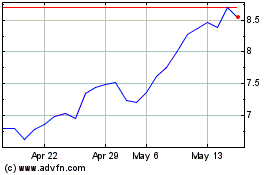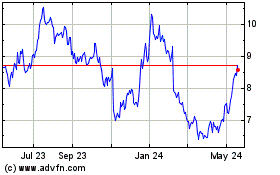Today's Logistics Report: Maersk Seeks Anchor; Canada's Rail Standoff; Garlic Markets Pressed
February 21 2020 - 10:31AM
Dow Jones News
By Paul Page
Sign up: With one click, get this newsletter delivered to your
inbox.
The world's biggest container shipping line is racing to
withdraw capacity as fast as business demand is falling. A.P.
Moeller-Maersk Chief Executive Soren Skou says Maersk Line has
pulled more than 50 scheduled sailings from its China services
since late January, the WSJ's Costas Paris and Dominic Chopping
report, part of the broader retrenchment of shipping services in
the wake of the coronavirus outbreak. The company's large scale
leaves it heavily exposed to the steep decline in China volumes
since Beijing imposed an extraordinary series of restrictions aimed
at restricting the spread of the virus. Factory output remains
weak, but Mr. Skou says transport barriers within China are
hampering exports as well since truck drivers face big hurdles in
moving goods to ports. That could add to Maersk's financial pain
this year after the carrier unveiled a surprise $72 million net
loss in the quarter ending Dec. 31.
TRANSPORTATION
A standoff on Canada's freight rail tracks is starting to bite
into the country's economy. The two-week-old blockade of rail lines
by protestors of a proposed natural-gas pipeline is stranding key
shipments and snarling supply chains, the WSJ's Paul Vieira
reports, triggering layoffs in some operations and raising alarms
at factories and export centersI. Canadian National Railway is
laying off 450 workers while shipping customers scramble for scarce
alternatives. One logistics broker says freight rates for trucks
have climbed as much as 20% since the protests began for those
shippers that can secure road transport. Food-packaging provider
CKF Inc. says the blockades "have caused some supply-chain chaos,"
but the company is eating the higher costs to keep customers
satisfied. Economists say the stoppages threaten to shave 0.1% to
0.3% from Canada's economic output this month, but the damage could
grow the longer the interruption continues.
COMMODITIES
There's no escape in the kitchen from the impact of the
coronavirus outbreak. Prices for garlic are jumping to the highest
levels in two years, the WSJ's Lucy Craymer reports, because of
disruptions in supply from China, the world's biggest producer of
the aromatic bulbs. The rising garlic costs contrast with a more
general downturn in agriculture prices because of dimming demand in
China, highlighting the fractured impact of the outbreak on trade
flows. Garlic production in China has slowed since authorities
sounded alarms over the spread of the virus in late January.
Because garlic takes nine months to grow, the recent price
increases may be the first taste of still higher prices over the
coming year. One of America's largest garlic producers and
suppliers says it has reached out to growers in other countries to
mitigate big increases in wholesale prices.
QUOTABLE
IN OTHER NEWS
The U.S. forecasts a tough year for American farmers, with weak
prices for key commodities hurting earnings. (WSJ)
Beverage supplier Diageo will pay $5 million to settle
securities charges that it hit performance goals by pressuring
distributors to buy products in excess of demand. (WSJ)
Royal Dutch Shell expects liquefied natural gas production
growth to slow by half this year. (WSJ)
Sportswear maker Puma SE says its chief challenge in China is
obtaining trucking and shipping permits for wholesale and
e-commerce distribution. (WSJ)
The U.S. Department of Transportation will make $1 billion
available f or infrastructure projects through its BUILD program.
(Supply Chain Management Review)
Chinese personal computer supplier Lenovo plans to increase
production overseas because of domestic manufacturing disruptions.
(South China Morning Post)
Caterpillar named Pam Heminger vice president in charge of its
strategic procurement division. (Industrial Distribution)
Seaspan's fourth-quarter profit rose 10.1% to $70.7 million and
the container ship owner says its charter markets are insulated
from the coronavirus impact. (Lloyd's List)
Investment group Jefferies lowered its estimates for listed
dry-bulk shipping companies. (TradeWinds)
Dry-bulk operator Star Bulk Carriers Corp.'s fourth-quarter
profit more than doubled to $23.5 million. (ShippingWatch)
London-based Clarksons PLC acquired Spanish shipbroking firm
Martankers. (Splash 247)
Atlas Air says shippers and freight forwarders are trying to
line up capacity for an expected surge in China exports in the
second quarter. (Air Cargo World)
Air France-KLM group cargo revenues fell 13.7% on a 5% drop in
tonnage. (Air Cargo News)
ABOUT US
Paul Page is editor of WSJ Logistics Report. Follow the WSJ
Logistics Report team: @PaulPage , @jensmithWSJ and @CostasParis.
Follow the WSJ Logistics Report on Twitter at @WSJLogistics.
Write to Paul Page at paul.page@wsj.com
(END) Dow Jones Newswires
February 21, 2020 10:16 ET (15:16 GMT)
Copyright (c) 2020 Dow Jones & Company, Inc.
AP Moller Maersk AS (PK) (USOTC:AMKBY)
Historical Stock Chart
From Mar 2024 to Apr 2024

AP Moller Maersk AS (PK) (USOTC:AMKBY)
Historical Stock Chart
From Apr 2023 to Apr 2024
